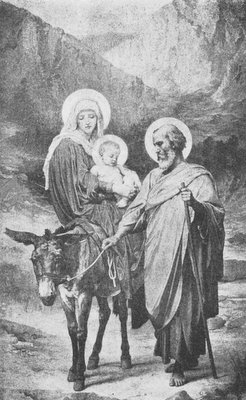M,
I really enjoyed our recent discussion of Luke chapter 1. One passage You raised in connection with Luke’s account of the birth of Jesus was something from Matthew’s Gospel:
"But he had no union with her until she gave birth to a son. And he gave him the name Jesus". (Matthew 1:25)
You explained that this passage proves or at least implies that Joseph and Mary had marital relations after Mary gave birth to Jesus. Certainly some Christians hold this interpretation, but is it really supported by Scripture?
 In fact, the passage "only says what it actually says": that up to the time of Jesus' birth there were no marital relations between Mary and Joseph. Matthew is defending the reality of the virgin birth, and here he is trying to demonstrate that the conception of Jesus was brought about by God, not Joseph. Therefore the passage relates to the time leading up to the birth of Jesus. It doesn't actually say or imply anything about what might have happened later. Using this passage to argue that Mary and Joseph subsequently had marital relations simply isn’t justified by Matthew’s statement.
In fact, the passage "only says what it actually says": that up to the time of Jesus' birth there were no marital relations between Mary and Joseph. Matthew is defending the reality of the virgin birth, and here he is trying to demonstrate that the conception of Jesus was brought about by God, not Joseph. Therefore the passage relates to the time leading up to the birth of Jesus. It doesn't actually say or imply anything about what might have happened later. Using this passage to argue that Mary and Joseph subsequently had marital relations simply isn’t justified by Matthew’s statement. The word translated "until" in Matthew 1:25 comes from the Greek word, "hou". This word is used in a similar manner in a number of other New Testament (and Greek Septuagint Old Testament) passages, along the lines that "'X' happened (or didn’t happen) until 'Y'". (Occasionally "hou" is translated as "unto" or "till".) Sometimes the implication is that once 'Y' occurred, 'X' changed. In other passages, once 'Y' occurs 'X' clearly does not change. Sometimes the context suggests what happens subsequently, but other times it does not.
You asked me for an example of a passage where 'X' clearly does not change once 'Y' occurs; here are several relevant examples:
"Therefore Michal the daughter of Saul had no child unto the day of her death." (2 Samuel 6:23 KJV)
...Does this imply that Michal had children after the day of her death? Of course not.
"The LORD says to my lord: 'Sit at my right hand, till I make your enemies your footstool.'" (Psalm 110:1 RSV)
...Does this mean that once Jesus' enemies are subdued He shall no longer sit at the Father’s right hand? Certainly not.
"For he must reign until he has put all his enemies under his feet." (1 Corinthians 15:25 RSV)
...Shall the reign of Christ end once His enemies are vanquished? No way.
"But when Paul had appealed to be kept in custody for the decision of the emperor, I commanded him to be held until I could send him to Caesar." (Acts 25:21 RSV)
...Does this imply that Paul would be released once he was sent to Caesar? Not at all. Paul's release would depend upon Caesar's verdict.
[The Son of God says,] "But to the rest of you in Thyati'ra, who do not hold this teaching, who have not learned what some call the deep things of Satan, to you I say, I do not lay upon you any other burden; only hold fast what you have, until I come." (Revelation 2:24-25 RSV).
...Once Jesus comes are the believers of Thyatira no longer to hold fast to what they believe? Of course not.
The point of highlighting these verses is to demonstrate that when the Bible says "Condition 'X' exists until event 'Y'", it doesn't necessarily mean that Condition 'X' changes after 'Y'. We have proved this by identifying several scriptural passages where 'X' clearly does not change after 'Y'.
Catholics and many Protestants differ on whether Mary bore natural children after the birth of Jesus. But it should be clear by now that Matthew 1:25 offers nothing to support the theory that Mary and Joseph ever had marital relations.



No comments:
Post a Comment
Thoughtful comments are welcome. Thank You for visiting!.
(Comments are moderated and usually approved the same day.)